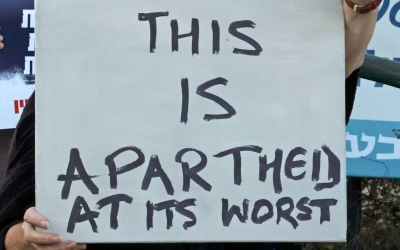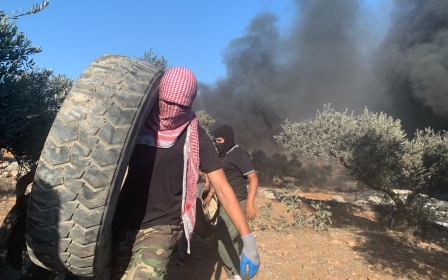Israel: Warning of harm to US ties after attorney general legalises settler outpost

Israel's attorney general Avichai Mandelblit has approved the illegal settler outpost of Evyatar, in the north of the occupied West Bank, mere hours before retiring from public life.
Mandelblit had served for six years as Israel's chief legal adviser and attorney general before concluding his job at the end of January.
Hours before leaving his post, Mandelblit on Tuesday authorised a deal between the Israeli government and Shomron Regional Council, a settler organisation, to legalise the outpost, created on the land of the Palestinian village of Beita. However, the Minister of Defence Benny Gantz would have the final approval over the matter, Israeli media reported.
Following relentless Palestinian protests against the land grab by settlers to create Evyatar, Israel in July struck a deal with settler leaders that would see the outpost turned into a religious school and a military base for the Israeli army.
The deal also said that Israeli forces will keep about 50 caravan settler houses that were installed last May on Palestinian land belonging to the residents of Beita, and that settlers would "return" to the land when Israeli authorities designate it as "state-owned".
Mandelblit's decision to okay settlers' return to Evyatar and make it legal prompted criticism from Israeli politicians over the fear of hurting ties with western allies.
Israeli Foreign Minister Yair Lapid warned of harming ties with US President Joe Biden's administration.
Lapid has sent a strongly worded letter to Prime Minister Naftali Bennett, saying that senior US officials have warned Israel of the consequences of moving ahead with the legalisation of the outpost, Haaretz reported on Thursday.
Merav Michaeli, the head of the Labor party and the minister of transportation, said that "the plan for Evyatar badly harms relations with our closest allies and Israel's strategic interests. Promoting [it] is playing politics at the expense of national security and the future of our country."
However, Yossi Dagan, a prominent settler leader and the head of Shomron Regional Council, lambasted Lapid's statement as "cynical and pathetic".
"Zionism must not die out in 2022," Dagan said. "The Land of Israel will be built and the Zionist people will defeat your cynicism," he added, referring to Lapid.
Apartheid state
The Israeli anti-occupation group B'Tselem said in a statement that Mandelblit's decision had "approved the establishment of a new settlement in the heart of the West Bank on land stolen from Palestinians".
This, B'Tselem added, comes at a time when "Israel cries out that it does not maintain an apartheid regime."
On Tuesday, Amnesty International released a report that labelled Israel as an apartheid state, becoming the latest organisation to join a cadre of human rights groups that have used the term to describe its discriminatory treatment of Palestinians.
Other Israeli politicians also warned of going ahead with legalising Evyatar.
Nachman Shai, an MK from the Labor party, tweeted that he is opposed to the plan that "will lead to a wave of opposition to Israel in the world, precisely at a time when we need international support in dealing with the Iranian threat."
In May last year, amid the political and media focus on the Israeli war on Gaza and the violent crackdown on Palestinians in occupied East Jerusalem, Israeli settlers moved to Mount Sabih, or Jabal Sabih in Arabic, located on the southern outskirts of Beita.
Within days, settlers installed mobile houses, built roads and raised an Israeli flag over the settlement. Since then Beita villagers have protested the presence of the illegal settlement, with Israeli soldiers killing and injuring a number of Beita residents.
Israel illegally occupied the West Bank and East Jerusalem in the 1967 Middle East war and has since exponentially expanded settlements on occupied lands, which now house 650,000 Israelis, a vital electoral base for Israeli politicians.
Middle East Eye delivers independent and unrivalled coverage and analysis of the Middle East, North Africa and beyond. To learn more about republishing this content and the associated fees, please fill out this form. More about MEE can be found here.






